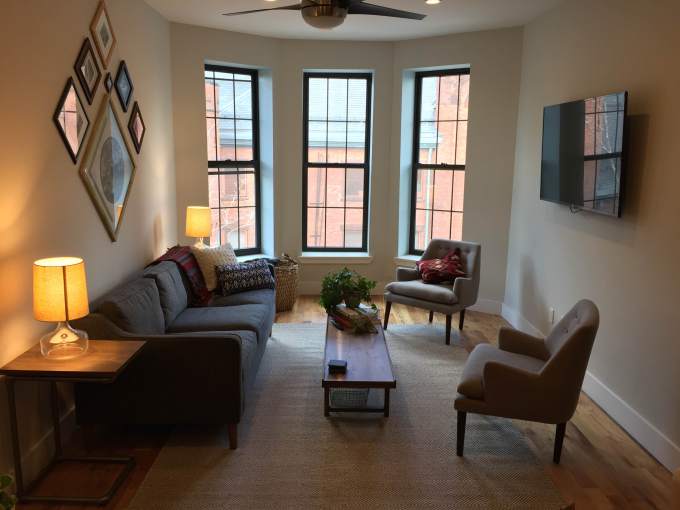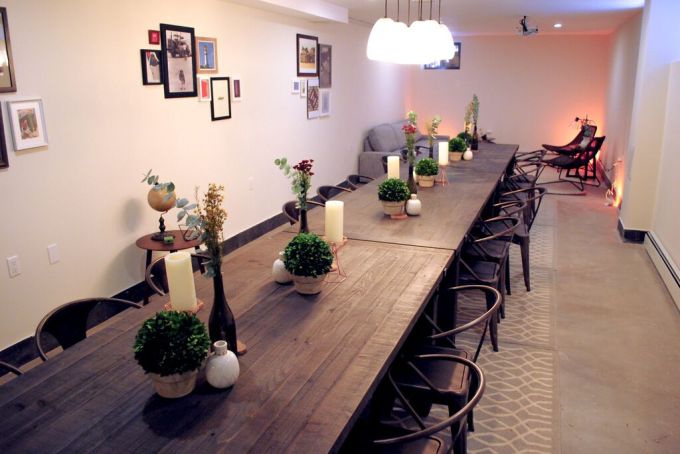Common, a co-living startup from General Assembly co-founder Brad Hargreaves, is unveiling its first building today in Brooklyn’s Crown Heights. With more than four floors and 7,300 square feet of space, the building has 19 private bedrooms costing anywhere from $1,800 to $1,950. Along with the private rooms, comes four communal kitchens, a large dining room, work space and a roof deck.
The Common opening comes at a time when venture-backed companies like WeWork are piling into co-living as a way to use urban residential space more cost-efficiently and to attract Millennials, who are delaying marriage and families later and later. In New York, older tenant laws control the number of tenants that can be listed on a lease, and brokers often charge upwards of a month’s rent to find apartments. That makes it difficult for newcomers to find housing easily compared to other American cities. On the property owner side, Common’s pitch is that they can partner to purchase whole vacant buildings and turn them into stable, market-rate income streams while removing the hassles of leasing and property management.
Over the summer, Common partnered with a local New York City real estate developer to buy Crown Heights building earlier this year. They invested a little less than $1 million in re-modeling the space.
They kept four suites or units in tact, but opened up large dining and work areas. “The whole idea here is is to use common areas and activate typically under-utilized space,” Hargreaves told me in a video tour via Skype.

Common built in several smart phone features like Bluetooth door locks compatible with keycards, phones and the Apple watch, and Nest thermostats. Through Hargreaves’ connections, they added mattresses from the startup Casper, along with furniture from Restoration Hardware and West Elm.
“Aesthetically, I would say it’s mid-century Modern with some Hudson Valley Americana built into it,” he said. “We wanted to evoke the neighborhood as well. A lot of the art is from Crown Heights and the furniture are things you would find in a traditional Brownstone.”
Services include free laundry, regular deliveries of coffee, tea and paper towels, and weekly cleanings in bathrooms and common areas. Utilities and wi-fi is baked into the price.

For the communal element, Common is bringing in Sunday potlucks and other kinds of event programming. He partnered with his old General Assembly co-founder Matthew Brimer, who went on to create the morning dance party Daybreaker. They’re bringing in Common residents to the next one. Hargreaves declined to share anything about the socioeconomic make-up of the residents, saying that he wanted residents to speak for themselves after they move in. Crown Heights is a majority black neighborhood, that has seen its African-American share of the population decline from 79 percent to 70 percent between 2000 and 2010.
About 250 people have applied for the 19 available Common spots so far in the neighborhood.
Some journalists have been critical of the co-living business model, with Buzzfeed calling it the latest way to “monetize the wantrepreneur lifestyle.”
But this is a narrow interpretation of what is happening in urban housing markets in the United States.
Co-living, or co-housing, is the reincarnation of a very old idea. From the Industrial Revolution onward, residential hotels, or buildings with month-to-month tenancy and no in-unit kitchens, were a major part of American urban living in the late 19th and early 20th century. They served a wide range of price tiers from luxury palace hotels on down through middle-income residential hotels and then into lower-income lodging houses and tenements. They were a response to overwhelming population growth stimulated by the Industrial Revolution, when the American population went from being 25.6 percent rural in 1870 to 51.2 percent urban in 1920. In San Francisco, residential hotels went from serving 1/16th of the city population in 1880 to 1 out of every 10 people by 1910. They later fell out of favor as the American middle-class left for the suburbs in the mid-20th century, turning residential hotels into the housing choice of last resort for the poor left behind in the urban core.
Today, coastal cities like New York, Los Angeles and San Francisco are growing once again, with an upward trend in population growth over three-and-a-half decades since 1980. This resurgence is putting an immense amount of pressure on inner-city neighborhoods that is obvious in gentrification battles from Brooklyn to the Mission District and on into Oakland.
Unless low-rise, suburban areas ringing the urban core step up and add housing and unless cities start scrutinizing the higher-end of the market where external capital is sitting in vacant units as pure investment rather than shelter, there will be an extraordinary amount of pressure to make urban residential space more efficient. At the same time, housing starts have been extremely slow into this economic recovery because of the hangover left after the last financial crisis — which was housing centric. Multi-family development and apartment buildings are leading the way, but federal housing policies and local zoning rules still favor single-family detached homes even though the pressure is for entire metropolitan regions to densify.
The entrepreneurial response to these pressures could take the form of more unscrupulous hacker hotels with $1,800 bunkbeds, or it can go in the direction of micro-units and other kinds of communal living.
As was true during the suburban tract home era, housing can take many forms from cheap, speculative development to more intentional design. Hargreaves is hoping to grab the middle to upper-middle segment of the market.
This is a risky business considering the amount of upfront capital that is necessary to compete in real estate markets. Earlier this year, San Francisco-based Campus went under as the unit economics on most of its properties were upside down. They could only make profit on houses that had more than eight or nine rooms. Still, the company managed to wind down the company by turning over master leases to the majority of its tenants, keeping the startup’s customers housed even as the startup went out of business.
WeWork has also been expected to enter the space with a WeLive product, which it projected to bring in $605.9 million in revenue three years after launch in a leaked investor slide deck published by Buzzfeed. It has been working on a large building in Crystal City in the Washington D.C. metropolitan area.
For now, Hargreaves is focused on New York City with two buildings slated for opening in Brooklyn.He has raised about $7.35 million from Maveron and other investors this year.





























Comment